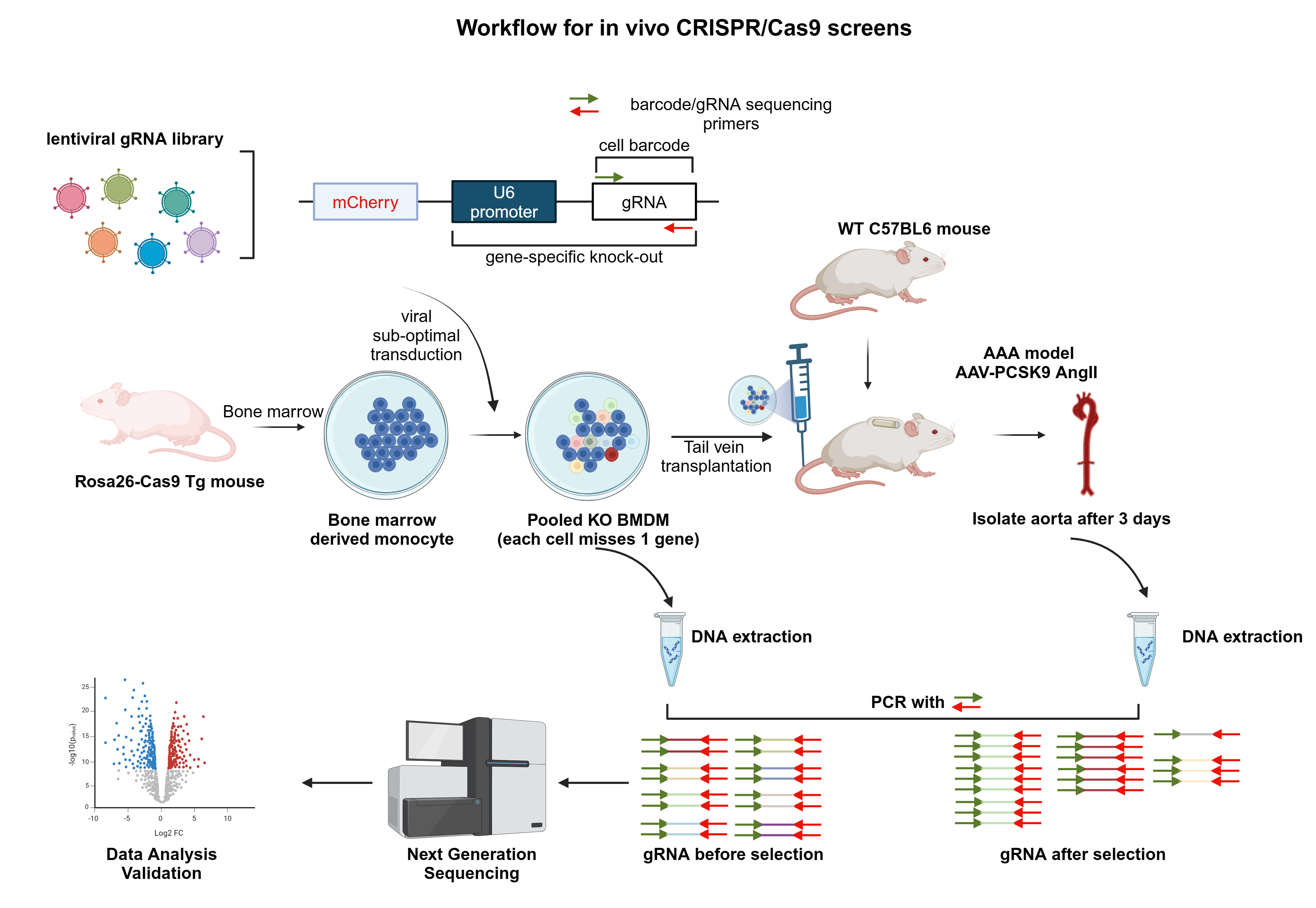Final ID: Tu021
Genome-wide CRISPR Screen In Vivo Decodes Monocyte Infiltration Associated With Abdominal Aortic Aneurysm
Abstract Body: Introduction: Aortic aneurysm is the second most common aortic disease following atherosclerosis and accounts for the ninth-leading cause of death overall. The inflammatory response has a crucial role in the Abdominal Aortic Aneurysm (AAA) development. The infiltration of monocyte into aortic wall is a hallmark of aortic inflammation and it still requires further understanding of this complicated process. CRISPR screening is a powerful tool to investigate biological process, but it requires large pool of mutant cells and reliable selection procedure, which can usually only be performed in vitro or in xenograft models. To overcome this problem, we developed an unbiased genome-wide CRISPR-Cas Screen for Monocyte Infiltration in vivo (CRISPR-MI) and employed this new method in mouse AAA model to systematically study key genes regulating monocyte infiltration into aortic wall.
Hypothesis: Monocyte infiltration is an important process in AAA development and CRISPR-MI could be utilized to study this process in vivo.
Methods:To acquire enough monocytes for screen, we used the adoptive transfer method to transplant in vivo differentiated monocytes (bone marrow derived macrophage, BMDM) back into mouse circulation via tail vein injection. We optimized the lentivirus infection protocol, so that sgRNA library delivered by lentivirus can effectively knock out target genes in BMDMs. The BMDMs were infected with sgRNA library before adoptive transfer into AAA-model mice. After transfer, by comparing the sgRNA enrichment in different organs of receipt mice, we could identify key genes inhibiting monocyte infiltration.
Results: CRISPR-MI identified novels genes regulating monocyte infiltration into aorta in AAA model, including Trem2 gene. In vitro experiments confirmed that Trem2 knockout increased adhesion molecules and chemokine receptors expression.
Conclusions: CRISPR-MI can be used to identify new therapeutical targets for cardiovascular diseases.
Hypothesis: Monocyte infiltration is an important process in AAA development and CRISPR-MI could be utilized to study this process in vivo.
Methods:To acquire enough monocytes for screen, we used the adoptive transfer method to transplant in vivo differentiated monocytes (bone marrow derived macrophage, BMDM) back into mouse circulation via tail vein injection. We optimized the lentivirus infection protocol, so that sgRNA library delivered by lentivirus can effectively knock out target genes in BMDMs. The BMDMs were infected with sgRNA library before adoptive transfer into AAA-model mice. After transfer, by comparing the sgRNA enrichment in different organs of receipt mice, we could identify key genes inhibiting monocyte infiltration.
Results: CRISPR-MI identified novels genes regulating monocyte infiltration into aorta in AAA model, including Trem2 gene. In vitro experiments confirmed that Trem2 knockout increased adhesion molecules and chemokine receptors expression.
Conclusions: CRISPR-MI can be used to identify new therapeutical targets for cardiovascular diseases.
More abstracts on this topic:
A mechanism whereby SGLT2 inhibitor dapagliflozin reverses cardiac diastolic dysfunction in a model of HFpEF
Liu Man, Liu Hong, Kang Gyeoung-jin, Kim Eunji, Neumann Mitchell, Johnson Madeline, Murikinati Ruthvika, Dudley Samuel
Comparative Outcomes of Local-Regional Versus General Anesthesia in Endovascular Aortic Aneurysm Repair: A Systematic Review and Meta-AnalysisQueiroz Ivo, Mulatti Grace, Mesquita Cynthia, Barbosa Lucas, Fernandez Miguel, Diaz Braiana, Pimentel Junior Dilson, Monteiro Mastra Fontoura Milena, Bertolino Enrico, Tavares Arthur

